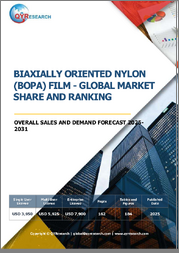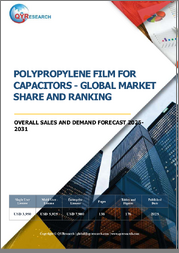
|
시장보고서
상품코드
1702507
일본의 이축연신 폴리프로필렌(BOPP) 필름 시장 평가 : 필름 두께별, 용도별, 지역별, 기회, 예측(2019년-2033년)Japan Biaxially Oriented Polypropylene Film Market Assessment, By Film Thickness, By Application, By Region, Opportunities and Forecast, FY2019-FY2033F |
||||||
일본 BOPP 시장 규모는 2025년 20억 1,000만 달러에서 2033년에는 31억 8,000만 달러에 달할 것으로 예상되며, 2026-2033년의 예측 기간 동안 5.91%의 연평균 복합 성장률(CAGR)로 성장할 것으로 예상됩니다. 식품 폐기물을 줄이기 위한 노력이 증가함에 따라 우수한 장벽 특성과 강도를 가진 BOPP 필름과 같은 고급 포장 솔루션에 대한 수요가 증가하고 있습니다. 또한, 일본의 기술 발전으로 고성능 필름을 생산할 수 있게 되었으며, 시장 리더들은 투명성, 강도, 인쇄 적합성을 향상시키기 위한 연구개발에 투자하고 있습니다. 또한, 일본의 이축연신 폴리프로필렌(BOPP) 필름 시장은 전자상거래 산업의 성장으로 인해 수요가 급증하고 있으며, 이는 견고한 포장 솔루션에 대한 수요로 이어지고 있습니다.
일본 경제산업성(METI)이 일본의 전자상거래(EC) 시장을 분석하기 위해 2023년도에 실시한 전자상거래 시장 조사에 따르면, 일본 국내 B2C EC 시장 규모는 약 1,650억 달러로 전년도 1,500억 달러에서 9.23% 증가했습니다. 국내 B2B 전자상거래 시장 규모는 3조 1,200억 달러로 전년 2조 8,000억 달러 대비 10.7% 증가했습니다.
일본의 이축연신 폴리프로필렌(BOPP) 필름 시장에 대해 조사 분석했으며, 시장 규모와 예측, 시장 역학, 주요 기업 개요 등의 정보를 전해드립니다.
목차
제1장 프로젝트의 범위와 정의
제2장 조사 방법
제3장 주요 요약
제4장 고객의 소리
- 응답자 인구통계
- 구입 결정에서 고려해야 할 요소
- 리드타임
- 가격
- BOPP 필름 두께
- 이용 요건
제5장 일본의 이축연신 폴리프로필렌(BOPP) 필름 시장 전망(2019년-2033년)
- 시장 규모 분석과 예측
- 금액
- 수량
- 시장 점유율 분석과 예측
- 필름 두께별
- 용도별
- 지역별
- 기업별 시장 점유율 분석(주요 5개사와 기타 - 금액 기준, 2025년도)
- 시장 맵 분석(2025년도)
- 필름 두께별
- 용도별
- 지역별
제6장 Porter의 Five Forces 분석
제7장 PESTLE 분석
제8장 수출입 분석
제9장 가격 분석
제10장 시장 역학
- 시장 성장 촉진요인
- 시장이 해결해야 할 과제
제11장 시장 동향과 발전
제12장 사례 연구
제13장 경쟁 구도
- 시장 리더 주요 5개사의 경쟁 매트릭스
- 주요 7개 시장 기업 상황
- Futamura Chemical Co., Ltd.
- Toyobo Co., Ltd
- RM TOHCELLO Co., Ltd
- TOPPAN Holdings Inc
- KOHJIN Film & Chemicals Co., Ltd
- Toray Industries, Inc
- Zhejiang Kinlead Innovative Materials Co., Ltd.
제14장 전략적 제안
제15장 리서치사에 대해 & 면책사항
LSH 25.04.24Japan BOPP market is projected to witness a CAGR of 5.91% during the forecast period FY2026-FY2033F, growing from USD 2.01 billion in FY2025 to USD 3.18 billion in FY2033F. Rising efforts for reducing food wastage are boosting the demand for premium packaging solutions such as BOPP films, which possess superior barrier properties and strength. In addition, the technological advancements in the country enable the manufacturing of high-performance films, and the market leaders invest in research and development to enhance clarity, strength, and printability. Furthermore, the Japan biaxially oriented polypropylene film market is experiencing a surge in demand due to the e-commerce industry's growth, leading to a need for robust packaging solutions.
According to the Ministry of Economy, Trade and Industry (METI), an e-commerce market survey conducted in FY2023 to analyze the Japanese e-commerce (EC) market, the scale of the domestic B-to-C EC market increased to approximately USD 165 billion, up by 9.23% from USD 150 billion in the previous year. In addition, the scale of the domestic B-to-B EC market increased to USD 3.12 trillion, up by 10.7% from USD 2.8 trillion in the previous year.
Recyclability Driving Japan's BOPP Film Market
Recyclability emerges as one of the prominent growth drivers of the Japanese BOPP film market. The increment in environmental awareness and stringent regulations for reducing plastic pollution have diverted divert attention of companies to producing recyclable BOPP films to meet sustainability objectives. The films are strongly recyclable into flakes or pellets, and the recovered material is used again in the production of new products to foster circular economic practices. In addition, the innovative developments of enzymatic and solvent-based recycling technologies further promote recycling processes and render BOPP films eco-friendlier. Furthermore, the consumer preference for green packaging and strong commitments towards sustainability further propel the trend. The technological advancements in the country also ensure high-performance recyclable films with crucial properties such as barrier strength and clarity retained during the recycling process. These trends define recyclable BOPP films as a cornerstone in Japan's sustainable packaging.
In October 2024, TOPPAN, RM Tohcello, and Mitsui Chemicals developed a recycled biaxially oriented polypropylene film (BOPP) for mass production. The partnership has conducted a pilot test for horizontal recycling of printed BOPP flexible packaging film since August 2023. The new recycled BOPP film aligns with the Japanese Government's Resource Circulation Strategy for Plastics, which aims for 60% of plastic containers and packaging to be reused or recycled by 2030.
Growing Demand for Automotive Capacitor Film in The Electrified Vehicle Market
The expansion of electronic vehicles (EVs) and hybrid electric vehicles (HEVs) is significantly driving the demand for the automotive capacitor films, which are made up of BOPP films. The automotive capacitor films are responsible for power electronic applications such as inverters, DC-DC converters, and onboard chargers due to their capability for efficient energy storage and smooth power conversion between the battery and motor. BOPP films are increasingly used as dielectric films for capacitors due to their excellent electric insulation, heat stability, and climatic resistance. Since Japan is promoting sustainable mobility solution conversions at an accelerated pace, there is an increased demand for effective power management systems and consequently, creating robust demand for BOPP films. Furthermore, low weight and excellent ripple current resistance of BOPP films make them suitable to meet stringent automotive requirements. The trend underscores a central role in the facilitating production of efficient and high-performance electrified vehicles in the automotive sector in Japan.
In June 2023, Toray Industries, Inc. announced its plans to increase production capacity for Torayfan biaxially oriented polypropylene film at its Tsuchiura Plant in Ibaraki Prefecture to meet growing demand for automotive capacitor film in the electrified vehicle market. The upgraded facilities will lift Torayfan production capacity by 40% by 2025. Torayfan is a lightweight, tough, and strong plastic film used in industrial areas, film capacitors, and packaging.
Rising Demand for Sustainable and Eco-Friendly Packaging Solutions
Growing demand for sustainable and environmentally friendly packaging is being driven by growing consumer awareness and stringent government control, such as prohibitions against single-use plastics. The consumers are progressively preferring packaging made from compostable, biodegradable, or recycled materials that reduce carbon footprints and environmental pollution. The recyclable and environmentally friendly packaging materials like paper, plant-based substances, and biodegradable plastics are on the rise with their ability to protect the products alongside conserving the environment. Additionally, companies are evolving by developing innovative packaging designs that minimize the use of material alongside eliminating unnecessary parts that consumers are gravitating towards when it comes to environmentally friendly products. Furthermore, the food and beverage packaging sector adopted a sustainable packaging trend with its resilience and inert quality that repels contaminants. The rise of climate climate-conscious generation like Gen Z further opened the way to the rapid adoption of green solutions, compelling companies to reach sustainability goals and increase operational effectiveness. The trend underscores the absolute necessity of sustainable packaging to mend global environmental concerns.
According to Japan Statement 29 May 2023, under agenda item 4, Japan expressed gratitude to France for hosting the second session of the Intergovernmental Negotiating Committee (INC2) to develop an international instrument on plastic pollution, including in the marine environment. The Japanese delegation emphasized the urgent need to address the adverse impact of plastic pollution on the environment and human health. They proposed adding elements critical for an effective instrument, including objectives and a common goal, mechanisms to prevent plastic pollution release, provisions on National Action Plans and National Reporting mechanisms, and raising awareness about plastic circularity.
Food and Beverages Sector is One of the Prominent Applications of BOPP Films
The food and beverages sector is a major application area for BOPP films, as they have superior properties that ensure safety, freshness, and extended shelf life for the product. BOPP films offer effective barrier protection against moisture, oxygen, and contamination and are thus ideally suited for packaging snacks, bakery items, confectionery, dried fruits, and frozen foods. Their transparency enhances visibility on shelves, while their printability allows for colorful branding and informative labeling. In the packaging of soft drinks, water, and alcoholic beverages, BOPP films are widely applied to label bottles and cans due to their tear resistance and smooth application on curved surfaces. The films are also light in weight, cost-effective, and recyclable, keeping up with the growing demand for environmentally friendly packaging. Their flexibility offers customization of thickness and finishes to meet specific requirements in various food segments. With changing consumer preference towards convenience foods and eco-friendly packaging, BOPP films are still at the forefront of transforming the manner in which food and beverages are packaged in Japan.
In May 2022, Mitsui Chemicals Inc. unveiled the RePLAYER Renewable Plastics Layer System, intending to recover film waste from flexible packaging converters, removing any ink, pelletizing the remaining material, and converting the pellets into fresh flexible packaging film. Later in December 2022, TOPPAN, RM Tohcello, and Mitsui Chemicals began discussing the foundation for a collaborative pilot testing effort.
Future Market Scenario (FY2026- FY2033F)
The increasing popularity of packaged foods in Japan, driven by convenience and safety concerns, will continue to fuel the demand for BOPP films in food packaging.
Advancements in manufacturing technologies will enable the production of high-performance BOPP films with enhanced barrier properties and printability, catering to diverse applications.
The expanding automotive sector, particularly in electrified vehicles, will increase the demand for BOPP films used in automotive capacitor films, driving market growth.
The rise of e-commerce and the growing personal care industry will further enhance the demand for flexible and sustainable packaging solutions like BOPP films.
Key Players Landscape and Outlook
The key players in the Japanese BOPP film market are leveraging advanced technologies and focusing on innovation to meet higher demand for high-performance film across different end-user sectors. In addition, the companies are also emphasizing building product properties such as barrier strength, purity, and durability to meet applications such as food packaging, pharmaceuticals, and electronics. Sustainability is a top priority, with an emphasis on developing recyclable and eco-friendly film solutions to meet environmental regulations and customer requirements. Furthermore, strategic initiatives such as capacity expansion and R&D investments enable them to suitably respond to shifting market demands. Their competitive strategies ensure steady supply and flexibility in the dynamic market landscape of Japan.
In March 2025 TOPPAN Inc. obtained ISCC PLUS certification from its Fukaya, Gunma, and Fukusaki plants in Japan to increase the use of recycled plastic in flexible packaging manufacturing. The certification aims to demonstrate businesses' sustainability standards and ensure transparency in supply chains. TOPPAN plans to offer packaging using recycled plastic in Japan and overseas markets.
Table of Contents
1. Project Scope and Definitions
2. Research Methodology
3. Executive Summary
4. Voice of Customers
- 4.1. Respondent Demographic
- 4.2. Factors Consider in Purchase Decision
- 4.2.1. Lead Time
- 4.2.2. Price
- 4.2.3. BOPP Film thickness
- 4.2.4. Application Requirement
5. Japan Biaxially Oriented Polypropylene Film Market Outlook, FY2019-FY2033F
- 5.1. Market Size Analysis & Forecast
- 5.1.1. By Value
- 5.1.2. By Volume
- 5.2. Market Share Analysis & Forecast
- 5.2.1. By Film Thickness
- 5.2.1.1. Below 15 Microns
- 5.2.1.2. 15-30 Microns
- 5.2.1.3. 30-45 Microns
- 5.2.1.4. Above 45 Microns
- 5.2.2. By Application
- 5.2.2.1. Food and Beverages
- 5.2.2.2. Tobacco
- 5.2.2.3. Medical and Pharmaceutical
- 5.2.2.4. Industrial
- 5.2.2.5. Others
- 5.2.3. By Region
- 5.2.3.1. North [Hokkaido and Tohoku]
- 5.2.3.2. Central [Kanto and Chubu]
- 5.2.3.3. South [Kansai, Chugoku, Shikoku, and Kyushu & Okinawa]
- 5.2.4. By Company Market Share Analysis (Top 5 Companies and Others - By Value, FY2025)
- 5.2.1. By Film Thickness
- 5.3. Market Map Analysis, FY2025
- 5.3.1. By Film Thickness
- 5.3.2. By Application
- 5.3.3. By Region
All segments will be provided for all regions covered
6. Porter's Five Forces Analysis
7. PESTLE Analysis
8. Import-Export Analysis
9. Pricing Analysis
10. Market Dynamics
- 10.1. Market Drivers
- 10.2. Market Challenges
11. Market Trends and Developments
12. Case Studies
13. Competitive Landscape
- 13.1. Competition Matrix of Top 5 Market Leaders
- 13.2. Key Players Landscape for Top 7 Market Players
- 13.2.1. Futamura Chemical Co., Ltd.
- 13.2.1.1. Company Details
- 13.2.1.2. Key Management Personnel
- 13.2.1.3. Key Products Offered
- 13.2.1.4. Key Financials (As Reported)
- 13.2.1.5. Key Market Focus and Geographical Presence
- 13.2.1.6. Recent Developments/Collaborations/Partnerships/Mergers and Acquisition
- 13.2.1.7. SWOT Analysis for Top 5 Players
- 13.2.2. Toyobo Co., Ltd
- 13.2.3. RM TOHCELLO Co., Ltd
- 13.2.4. TOPPAN Holdings Inc
- 13.2.5. KOHJIN Film & Chemicals Co., Ltd
- 13.2.6. Toray Industries, Inc
- 13.2.7. Zhejiang Kinlead Innovative Materials Co., Ltd.
- 13.2.1. Futamura Chemical Co., Ltd.
Companies mentioned above DO NOT hold any order as per market share and can be changed as per information available during research work.



















